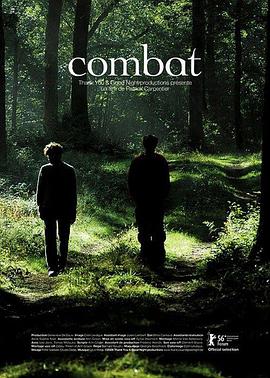Léo Joris-搜索结果
-
搏斗 Combat
类型:
导演:Patrick Carpentier 编剧:Patrick Carpentier
主演:Léo Joris, Tomas Matauko
Patrick Carpenter 的《The Irregularity of the tearing》分三部分讲述,是一部关于亲密关系、感官和欲望的电影日记。
第一部分 '上帝是条狗'(2004 年)采用超 8 胶片拍摄,讲述了电影制作人对童年记忆的回忆,以及这些回忆如何与他成年后的爱情际遇相互影响。
第二部分 'Les 9 mardis'(9 个星期二)(2005 年)讲述了时间倒流的荒谬性。时间重新揭开并缝合了过去的伤口,时间给了他继续前进的勇气。
最后一部是获奖作品《战斗》(2006 年)。故事讲述了两个深陷爱河的年轻人只能通过对彼此的身体暴力行为来表达感情。满月和郁郁葱葱的森林定格了这两个青春靓丽的男子之间感人至深的爱情故事。从整体上看,《战斗》给观众留下了惊奇和敬畏之感,同时也让人思考爱的真谛。
Noelle Reilly观点:
男同性恋性行为中最引人入胜的一个方面--也是本片所探讨的一个方面--就是我们的文化中已经习以为常的标志性支配-服从关系的缺失和/或替代。战斗》在这个问题上提出了一些有趣的观点:受虐狂是在同性恋发展的早期就被灌输的(主角从 14 岁开始就有一种自卑和恐惧感,当时他被几个孩子殴打,母亲告诉他应该还手),痛苦被提升为性兴奋的一种形式,同时也是一种放纵和忏悔的来源(当他们用身体伤害取代生殖器唤起并似乎乐在其中时,年轻的角色在结尾处断言:'我和你在一起感觉很好: '和你在一起我感觉很好。我是说,没有罪恶感'。这句话同时表达了爱情征服了根深蒂固的同性内疚情结,并承认这种被他的爱人称为 '惩罚 '的暴力行为是一种净化灵魂的行为)。
这部电影偶尔也很美(晨光中她们的皮肤让她们看起来像尸体,这在主题上很有吸引力),偶尔也很怪异(红色的风云必须消失),偶尔也很俗套(导演使用手持摄影机来增加暴力场面的 '内脏 '质感,这简直就是电影新生课上的东西)。
不过,抛开这些看法不谈,我还有一个最大的不满:由于影片对人物性格不感兴趣,通过一些不过是 '类型 '的人物来审视其特殊的性爱类型,因此无法让人产生情感上的共鸣。这通常不是我关心的事情,但导演显然希望我们投入感情:令人痛苦的严肃画外音太夸张了。
-- Noelle Reilly
原文简介:
Told in three parts, Patrick Carpenter’s “The Irregularity of the tearing” is a three part cine-diary on intimacy, sensuality and desire. Part one, “God is a Dog” (2004) is shot on Super 8 and confronts the film makers remembrances of childhood memories and how they interact with his adult love encounters. Section two, “Les 9 mardis” (The 9 Tuesdays) (2005) deals with the absurdity of the passage of time. Time that reopens and closes past wounds, time the provides the courage to continue.
The final installment is the award winning “Combat” (2006). The tale of two young men both deeply in love who can only express their feelings through acts of physical violence committed upon each other. Full moons and lush forests frame this deeply felt and moving love story between two beautiful, youthful men. In its entirety, “Combat” leaves the viewer with a sense of wonder and awe while contemplating the true meaning of love.
---REVIEW
One of the most intriguing aspects of gay male sexuality--and the one explored here--is the absence and/or replacement of the iconic dominant-submissive relationship our culture has gotten so used to. Combat offers a couple of interesting observations on the subject: masochism is instilled early homosexual development (a sense of inferiority and fear is stamped on the lead character from age 14 when he is beaten up by a couple kids & told by his mother that he should have fought back), and that pain elevated to a form of sexual arousal simultaneously serves as a source of indulgence and penitence (while they have replaced genital arousal with bodily damage & seem to enjoy it, the younger character asserts at the end: 'I feel good with you. I mean, not guilty.' It's simultaneously a statement about love conquering a deep-seeded homosexual guilt complex and a confession that this violence, which his lover refers to as 'punishment,' is a soul-cleansing act.)
The movie is occasionally beautiful (their skin in the morning light makes them look like corpses, which is thematically compelling), occasionally gharish (the red storm clouds have got to go), and occasionally clichéd (the director's use of hand-held cameras to increase the 'visceral' quality of its more violent scenes is something out of a freshman film class).
Nevertheless, these observations aside, I have a major complaint: since the movie has no interest in character and examines its particular breed of sexuality through people who are no more than 'types,' it is impossible to become emotionally involved. That is not usually something I care about, but the director clearly WANTS us to be emotionally involved: the agonizingly serious voice-over is WAY over the top.
-- Noelle Reilly





